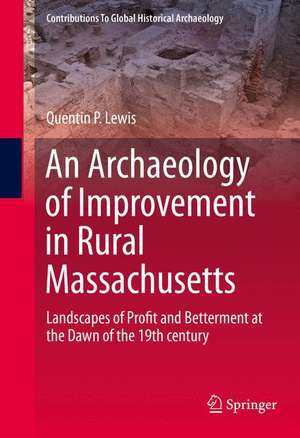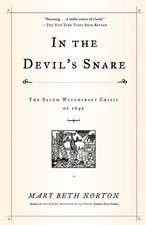An Archaeology of Improvement in Rural Massachusetts: Landscapes of Profit and Betterment at the Dawn of the 19th century: Contributions To Global Historical Archaeology
Autor Quentin Lewisen Limba Engleză Hardback – 2 dec 2015
Utilizing archaeological data from the home of a wealthy farmer in rural Western Massachusetts, as well as an analysis of early Republican agricultural publications, this book shows how Improvement’s twin meanings of profit and betterment unfolded unevenly across early 19th century New England. The Improvement movement in Massachusetts emerged at a time of great social instability, and served to ameliorate growing tensions between urban and rural socioeconomic life through a rationalization of space. Alongside this rationalization, Improvement also served to reshape rural landscapes in keeping with the social and economic processes of a modernizing global capitalism. But the contradictions inherent in such processes spurred and buttressed wealth inequality, ecological distress, and social dislocation.
| Toate formatele și edițiile | Preț | Express |
|---|---|---|
| Paperback (1) | 385.62 lei 6-8 săpt. | |
| Springer International Publishing – 23 aug 2016 | 385.62 lei 6-8 săpt. | |
| Hardback (1) | 392.97 lei 6-8 săpt. | |
| Springer International Publishing – 2 dec 2015 | 392.97 lei 6-8 săpt. |
Din seria Contributions To Global Historical Archaeology
- 15%
 Preț: 640.24 lei
Preț: 640.24 lei - 15%
 Preț: 642.36 lei
Preț: 642.36 lei - 15%
 Preț: 643.84 lei
Preț: 643.84 lei -
 Preț: 399.12 lei
Preț: 399.12 lei - 15%
 Preț: 639.90 lei
Preț: 639.90 lei - 15%
 Preț: 644.82 lei
Preț: 644.82 lei - 15%
 Preț: 636.80 lei
Preț: 636.80 lei - 15%
 Preț: 643.84 lei
Preț: 643.84 lei - 18%
 Preț: 949.23 lei
Preț: 949.23 lei - 15%
 Preț: 640.24 lei
Preț: 640.24 lei - 15%
 Preț: 640.06 lei
Preț: 640.06 lei - 15%
 Preț: 641.71 lei
Preț: 641.71 lei - 15%
 Preț: 646.75 lei
Preț: 646.75 lei - 15%
 Preț: 642.03 lei
Preț: 642.03 lei -
 Preț: 390.46 lei
Preț: 390.46 lei -
 Preț: 391.79 lei
Preț: 391.79 lei - 15%
 Preț: 642.51 lei
Preț: 642.51 lei - 15%
 Preț: 647.73 lei
Preț: 647.73 lei -
 Preț: 383.71 lei
Preț: 383.71 lei -
 Preț: 387.96 lei
Preț: 387.96 lei - 15%
 Preț: 643.99 lei
Preț: 643.99 lei - 18%
 Preț: 968.65 lei
Preț: 968.65 lei - 15%
 Preț: 639.08 lei
Preț: 639.08 lei - 15%
 Preț: 636.63 lei
Preț: 636.63 lei - 18%
 Preț: 954.93 lei
Preț: 954.93 lei -
 Preț: 384.86 lei
Preț: 384.86 lei - 15%
 Preț: 641.85 lei
Preț: 641.85 lei - 15%
 Preț: 641.53 lei
Preț: 641.53 lei - 15%
 Preț: 643.99 lei
Preț: 643.99 lei - 15%
 Preț: 645.28 lei
Preț: 645.28 lei - 18%
 Preț: 733.46 lei
Preț: 733.46 lei
Preț: 392.97 lei
Nou
Puncte Express: 589
Preț estimativ în valută:
75.20€ • 82.01$ • 63.41£
75.20€ • 82.01$ • 63.41£
Carte tipărită la comandă
Livrare economică 24 aprilie-08 mai
Preluare comenzi: 021 569.72.76
Specificații
ISBN-13: 9783319221045
ISBN-10: 3319221043
Pagini: 200
Ilustrații: XIII, 236 p.
Dimensiuni: 155 x 235 x 16 mm
Greutate: 0.53 kg
Ediția:1st ed. 2016
Editura: Springer International Publishing
Colecția Springer
Seria Contributions To Global Historical Archaeology
Locul publicării:Cham, Switzerland
ISBN-10: 3319221043
Pagini: 200
Ilustrații: XIII, 236 p.
Dimensiuni: 155 x 235 x 16 mm
Greutate: 0.53 kg
Ediția:1st ed. 2016
Editura: Springer International Publishing
Colecția Springer
Seria Contributions To Global Historical Archaeology
Locul publicării:Cham, Switzerland
Public țintă
ResearchCuprins
Preface.- Part 1: Improvement as archaeological subject.- Chapter 1: Rural Life and Historical Archaeology.- Chapter 2: Improvement, Capitalism, and Landscape Change.- Part 2: Improving New England at the dawn of the 19th century.- Chapter 3: Rural New England in Time and Place.- Chapter 4: Improvement and Agriculture in Massachusetts at the dawn of the 19th century.- Chapter 5: Excavating the Yeoman: Materializing the idealized people and landscapes of Improvement literature.- Chapter 6: The E.H. Williams House.- Chapter 7: The Logic of Improvement in the Williams Yard.- Chapter 8: Manuring and the political economy of Improvement.- Chapter 9: Conclusion.- Appendix: The archaeology of the EH Williams House.
Notă biografică
Quentin Lewis received his BA in Archaeology from Boston University, and his MA and PhD from the University of Massachusetts. He has conducted archaeological work in the Midwestern and Northeastern United States, as well as in the North of England, where he is currently an Honorary Research Fellow in Archaeology at Durham University. He has continued his lifelong personal and scholarly fascination with New England with research on historical memory and the development of capitalism. His newest research project involves studying the impacts of the Great Depression on the landscapes of the Northeast of England.
Textul de pe ultima copertă
This book probes the materiality of Improvement in early 19th century rural Massachusetts. Improvement was a metaphor for human intervention in the dramatic changes taking place to the English speaking world in the 18th and 19th centuries as part of a transition to industrial capitalism. The meaning of Improvement vacillated between ideas of economic profit and human betterment, but in practice, Improvement relied on a broad assemblage of material things and spaces for coherence and enaction.
Utilizing archaeological data from the home of a wealthy farmer in rural Western Massachusetts, as well as an analysis of early Republican agricultural publications, this book shows how Improvement’s twin meanings of profit and betterment unfolded unevenly across early 19th century New England. The Improvement movement in Massachusetts emerged at a time of great social instability, and served to ameliorate growing tensions between urban and rural socioeconomic life through a rationalization of space. Alongside this rationalization, Improvement also served to reshape rural landscapes in keeping with the social and economic processes of a modernizing global capitalism. But the contradictions inherent in such processes spurred and buttressed wealth inequality, ecological distress, and social dislocation.
Utilizing archaeological data from the home of a wealthy farmer in rural Western Massachusetts, as well as an analysis of early Republican agricultural publications, this book shows how Improvement’s twin meanings of profit and betterment unfolded unevenly across early 19th century New England. The Improvement movement in Massachusetts emerged at a time of great social instability, and served to ameliorate growing tensions between urban and rural socioeconomic life through a rationalization of space. Alongside this rationalization, Improvement also served to reshape rural landscapes in keeping with the social and economic processes of a modernizing global capitalism. But the contradictions inherent in such processes spurred and buttressed wealth inequality, ecological distress, and social dislocation.
Caracteristici
Discusses the improvement of rural agricultural landscapes in New England in the early 19th century Focuses on the role of Improvement as a cultural logic operating to manage and structure rural life Addresses the role that agriculture and symbolic constructions of urban and rural life played in structuring landscape change Includes supplementary material: sn.pub/extras















